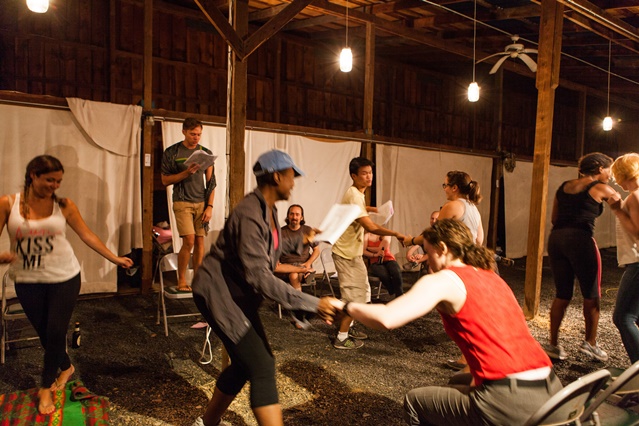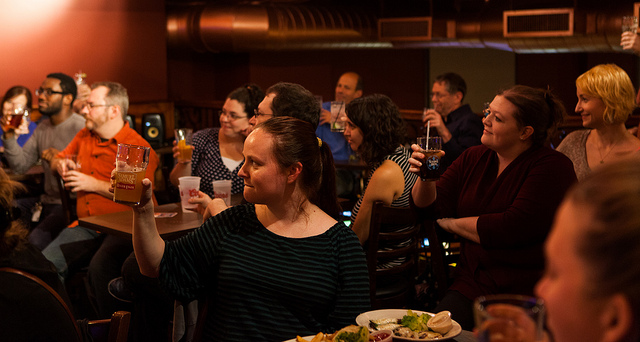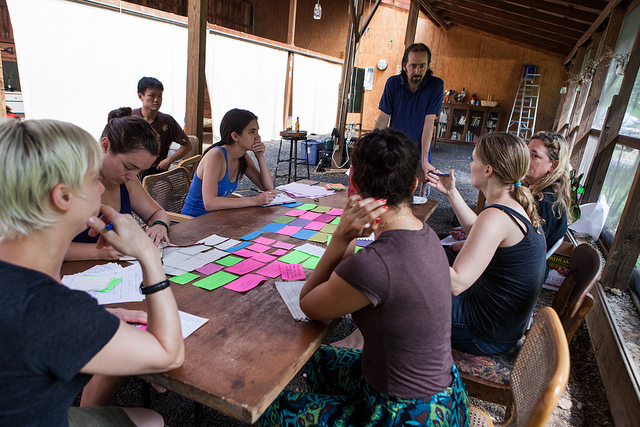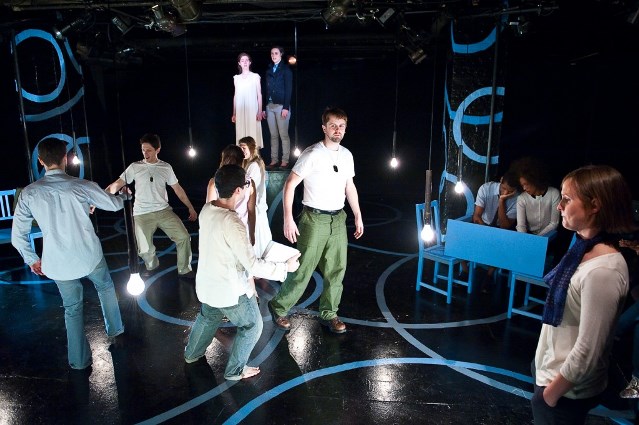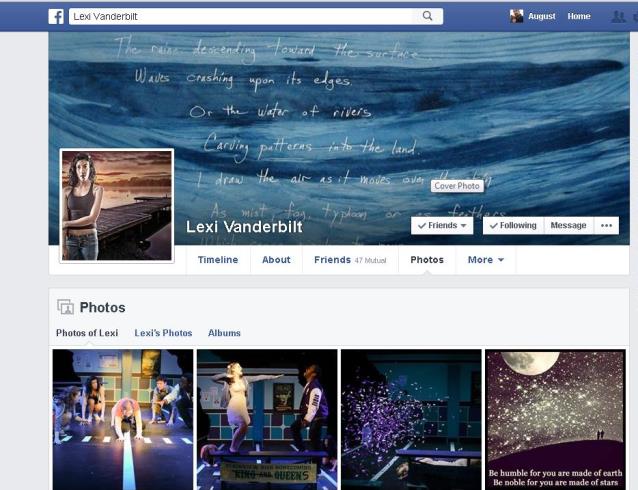Open Source Theatre
(Photo by Isaiah Tanenbaum of the workshop of Stepping at the 2013 Annual Retreat. Because nothing says open source like a get-up-and-dance party.)
Flux Theatre Ensemble is…
Creative Home – Ensemble Process – Open Source – New Worlds
Flux Theatre Ensemble uses Open Source Theatre to ripple out the impact of our programs and values beyond our immediate community. Our Open Source approach has four programs: Open House, Open Book, Open Stage and Open World. Read on to learn more about these programs and the overall Open Source Theatre approach.
Open Source Theatre:
“Open source projects, products, or initiatives are those that embrace and celebrate open exchange, collaborative participation, rapid prototyping, transparency, meritocracy, and community development.”
—The Open Source Way, OpenSource.com
When many of us hear “open source,” we’re likely to think software, but open source culture has spread beyond code to bring that values system to politics, education and more. In the arts field, where there’s been any conversation about open source, it’s been relegated to copyright laws, but we’re interested in broader application of those principles. Our Open House program makes our performances accessible to everyone with our Living Ticket initiative, while Open Book presents a detailed budget of our projects to promote transparency, accountability and equity. Our Open Stage initiative makes the blueprints of all of our programs available for others to use, adapt and share back. Finally, our Open World program takes the worlds of our plays and makes them open for everyone through online participatory creations. We expect further versions of our Open Source Theatre approach will evolve as we move forward.
Why Open Source Theatre? Flux’s mission has always been to build a creative home sustained by ensemble process. As we have grown, however, that mission has been complicated by questions like: “Who stands outside of our creative home, and why?” and “How can we ripple out our work to reach more people without dissipating the energies that hold us together?”
These questions are not just ours: we live in a time when our culture’s ethics haven’t scaled to keep up with technology’s reach, and so we ask ourselves, “What would the world look like if it functioned more like Flux?” Well, there’d be a lot more dance parties, for sure. But what if our government practiced ensemble consensus-building? What if our education system valued collaborative creativity as central to learning?
So we began to wonder: what if we could spread the code of ensemble practice through Open Source Theatre?
(Photo by Isaiah Tanenbaum from 2013 Have Another Retreat Harvest.)
Open House:
“We are not ready to adopt the point of view that human nature being what it is, people must be made to pay for something to appreciate it. A theater will create its own respect on the stage…The only practical means of insuring the permanence of our theater is to tie it in with civic responsibility.”
–Joseph Papp, New York Shakespeare Festival/The Public Theater, The Price of this Ticket is Responsibility
Beginning with the April 2015 production of Salvage, Flux is are no longer charging ticket prices for any of our productions. Flux has always offered free community-building programs like Have Another and Food:Soul, but with Open House, we’re removing the final economic barriers to participating with our work.
Central to the Open House program is the idea of the Living Ticket: we’re replacing the marketing tricks and one-time transactions of regular ticketing with an ongoing relationship of mutual support between Flux and our community. We’ll share the production’s budget in its entirety so that our community knows the true cost of producing this work, and what level of support it would take to pay our collaborators a living wage. Because not everyone can give financially what they value, we offer other opportunities to support the work, from spreading the word to volunteering during tech. Learn more about the Living Ticket here.
Why Open House? Flux has long experienced a dissonance between the community-building aspects of our creative home and the marketing strategies we’ve employed to get butts in seats. That dissonance has contributed to a lack of financial stability and an inability to pay our artists a living wage. We believe that Open House and the Living Ticket will not only increase the number of people connected to our programs and productions, but also their willingness to provide Flux with the resources we need to be sustainable. Paired with Open Book, Flux will contribute a different model for how theatre and communities value and sustain each other.
(Photo by Isaiah Tanenbaum from Flux’s 2013 retreat.)
Open Book:
“True belonging only happens when we present our authentic, imperfect selves to the world.”
–Brené Brown
Flux is now transparent: you can read us like an Open Book. We’re making our entire budget available—all the details—so our community knows the true costs of things. Paired with our Open House program, we believe this will empower a conversation with our community that treats them as equals, not marketing targets.
This frank conversation about value and cost will not only help Flux become more sustainable, but more equitable, as well. While we have long paid all contributors equally, we have not been able to pay anything approaching a living wage. In addition to the current budget that shows what our people are paid, we’ll also share stepping-stone budgets that show where we’re trying to go. When our community gives, they’ll know exactly where their resources are going, and more importantly, to whom.
Why Open Book? Our economic system continues to lead to greater income inequality, and our theatre field unfortunately often mirrors those challenges. Sunlight is the best disinfectant, and we believe that through radical transparency and the equity inherent in ensemble, we can present a new way forward. Learn the details about Open Book here.
(Photo of The Lesser Seductions of History by Tyler G. Hicks-Wright.)
Open Stage:
“The future is already here — it’s just not very evenly distributed.”
–William Gibson, The Science in Science Fiction
At the heart of Flux’s Open Source Theatre initiative is Open Stage, our commitment to sharing the blueprints of how our programs work for others to use, adapt and share back. From Have Another to Food:Soul, from the Annual Retreat to ForePlay, we’re putting the code online so you can try it out and improve it.
They key to Open Stage isn’t just sharing the code, but thinking about what code for live, in-person communal events could mean. As theatre-makers, we’ve inherited platforms that are thousands of years old, full of assumptions and traditions that aren’t always examined or challenged. We want to bring the rigor of coding to theatre, taking what we do apart line by line and seeing how we might hack, tinker and improve it. Then, we want to share what we find with others to use, adapt and share back.
We share these ideas for free in the belief that, as others find value in what we create, they’ll be inspired to support that work in the same manner as our local community does through Open House and Open Book.
Why Open Stage? When we think about Flux, we think about the people first; the extraordinary theatre-makers and theatre-lovers that make up our creative home. But Flux is equally sustained by process, the ensemble practices and values outlined here. If we believe in the value those processes have created, then how can we share them as widely as possible? We also believe Open Stage will allow us to connect with partners outside of the theatre-field who share Open Source values and who are looking for the tools of live collaborative creation that ensemble theatre provides.
(Screen shot of Lexi’s Facebook profile from Jane the Plain.)
Open World
“When we reject the single story, when we realize that there is never a single story about any place,we regain a kind of paradise.”–Chimamanda Ngozi Adichie
Our Open World program takes the worlds of our plays and makes them accessible for everyone through online participatory creations. We think of our productions as theatre-driven events that harness transmedia strategies to involve those who can’t attend in person or want a more participatory experience within the imaginary worlds we create. From the interactive Facebook characters of Jane the Plain to the crowdsourced super-villains of Hearts Like Fists; from the text adventure game of Once Upon A Bride There Was A Forest to The Salvage Project’s stories of our precious objects; Open World believes that by building imaginary worlds where many voices may participate, we can hack our real world and make it a better place.
Why Open World? The barriers between artistic disciplines are dissolving as artists are reaching across old borders to tell new stories through evolving mediums. At the same time, people are no longer interested in a simplistic, transactional relationship to art but want to be participating with it: making it, remixing it, engaging directly in meaning-making from multiple angles. There is never a single story about any place, and there will never be a single story about Flux’s work. Let’s regain a little paradise together, what do you say?

